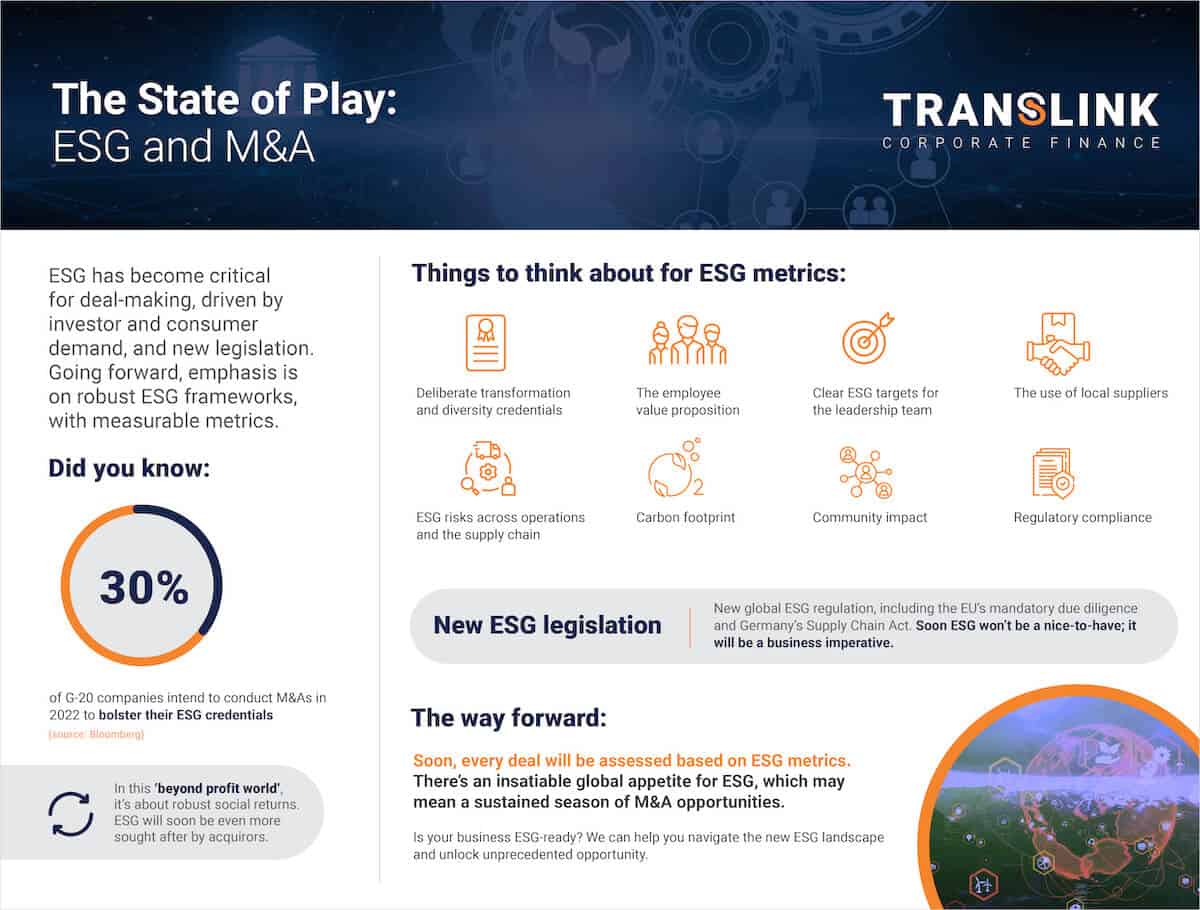April 19, 2022
By Josep Pere Gutierrez, Partner at Translink Spain
ESG (Environment Sustainability and Governance) has become an essential concern for deal-making, primarily driven by consumer and investor demand. Now, there are also critical legislative considerations from a myriad of countries. In the move to a stakeholder-centric model, there’s even greater focus on ESG integration, with entire supply chains being assessed. Going forward, we can expect robust ESG frameworks with a host of measurable metrics that will play a big role in acquisition decision-making.
It is no longer just investors that are driving ESG demand either; governments, employees and consumers seek to do business with companies that generate strong social returns. Recently, one of our clients – a Spanish specialist cheese manufacturer – experienced this first-hand. The company had previously promoted its responsible plastic use on its packaging. It removed this and revenues were almost immediately reduced. In the past, companies tended to grossly underestimate how much consumer’s social awareness has been growing.
Bloomberg reports that 30% of G-20 companies are intending to conduct M&As in 2022 to bolster ESG credentials. The emphasis on ESG is likely to add new layers of complexity to deal-making, with various risk considerations coming to the fore. Merger clearance may become more cost intensive and time-consuming, with additional ESG evidence to assess.
The current state of play with ESG
I believe we are at the beginning and ESG metrics will soon be highly sought after by acquirers. Right now, an ESG agenda is often driven by the values of the shareholders and how they present these to the world. I recently read that one of the main private equity firms in Spain has just hired two people with vast expertise in ESG – one specialising in environmental concerns, the other in governance. When this firm wants to invest, it’ll need to know how its targets’ ESG strategies align with its own. If the target is found wanting, the deal may not happen, or the price could be reduced.
Importantly, in this ‘beyond profit’ world, companies need to clearly communicate their greater purpose. They need to make it obvious how they’ve embedded ESG across multiple touch points, to the betterment of society. It’s showing the ‘human side’ of a brand that builds trust.
Factors for due diligence
ESG diligence will vary according to the type of business a target is conducting, and the country it is in. Traditionally, emphasis has been placed on human capital and environmental factors. The following are some things to think about including as ESG metrics:
- Deliberate transformation and diversity, at every business level, including its board
- Staff turnover and the employee value proposition
- The ESG KPIs for the leadership team
- How involved and effective a board is at executing an ESG strategy
- Whether local suppliers are used
- Prospective ESG-associated risks across operations and the supply chain (e.g., unsafe or abusive working conditions, lack of employee rights, etc.)
- Carbon emissions and sustainability practices relating to climate change mitigation
- Community impact – how an organisation is giving back locally
- ESG targets and compliance with various recognised standards, as set out by initiatives like the Global Reporting Initiative
- Transparent leadership with clearly defined decision-making responsibilities
Challenges
The challenge is that often more pressing priorities come up. For example, with the current situation between Russia and Ukraine businesses are prioritising damage control amidst an unsettled global market, rising inflation, and shortages of grain and gas.
ESG regulation will help to make these factors more of a must for businesses. The EU is proposing legislation linked to mandatory due diligence on supply chains. The German parliament just passed a similar Supply Chain Act.
Soon, we will probably also see the inclusion of ESG-associated performance metrics on remuneration. We’re on a tipping point where ESG won’t be a nice-to-have, it will become a business imperative.
Global trends will also hasten adoption along. For example, in Spain, the government has set aside EUR 800 million (until 2023) to encourage sales of electric cars. This makes it easier to make these choices.
The way forward
The leading companies of the future are those with relevant, robust ESG frameworks, strong ESG due diligence and the will to make a genuine difference in the world.
Soon, every deal will be assessed based on ESG metrics. There’s an insatiable global appetite for ESG, which may mean a sustained season of M&A opportunities.
It will be a critical way to unlock value. But, right now, it’s a highly complex risk landscape to navigate, that’s hard to measure and quantify, especially given that there are still no set standards across many ESG areas.
Translink can help your business to identify and integrate ESG opportunities and embed a sustainable framework. We can also ensure you broadcast your ESG value creation to relevant stakeholders to maximise access to investor capital and acquisition opportunities. Let us help your company create lasting value.
In May, Ian Carbó will join the Translink Corporate Finance international team as senior associate, bringing with him a wealth of knowledge regarding environmental, social and governance (ESG) metrics in M&As. This will add to our comprehensive understanding and experience in this space.














































































































































































